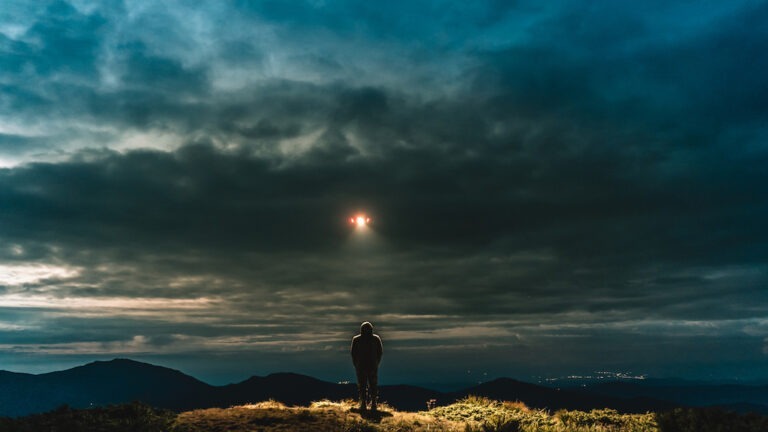Harvard Professor Avi Loeb Says Universe Created in a Lab

One of the greatest mysteries of our universe is the question of what existed before the Big Bang and how our universe was created. Could it have been created in a lab by a higher form of intelligence—an extraterrestrial intelligence?
Scientists have studied for years the possibilities that may have created the Big Bang; how our universe was created. Now, Avi Loeb, Harvard Professor of Science and author of “extraterrestrial: The First Sign of Intelligent Life Beyond Earth,” proposes in his latest editorial for Scientific American that our universe may have been created in a lab.
Modern physics has a problem, we do not yet have a good understanding of how to unify quantum mechanics and gravity. If we did, we could in theory figure out how to create a “Big Bang.” This idea led professor Loeb to his theory.
“If we imagine a civilization that had science and technology for much more than a century like we did, then they could have arrived at a theory that unifies quantum mechanics and gravity, and if they figure out how the Big Bang can be created perhaps they could also produce it themselves in the laboratory,” Loeb said. “And if that happens then there is a very interesting possibility, just like in nature, for example, a chick comes out of an egg, becomes a chicken and lays another egg, and so forth. You can imagine a universe like ours giving birth to an intelligent civilization that can create a universe like the one that made it.”
Imagine if different civilizations were given a letter grade; professor Loeb puts us at a Grade C, while the more advanced civilizations have higher grades.
“One can, in principle, classify civilizations in the universe into different classes. Type C civilization is similar to ours where we rely on the sun to keep us alive and we are using our environment the way it was provided to us. But then one can imagine a civilization Type B, which is not dependent on the star next to which it was born, in. fact it can create a habitat that supports its life far away from the star,” Loeb said.
“You can imagine them creating a platform where a civilization can live happily, using nuclear energy supplied to it from nuclear reactors and not from the star that it happens to be born next to, that would be Type B. Then Type A civilizations would be those that are capable of recreating the astrophysical environment that they live in, in particular, the universe as a whole. So, creating a universe in the laboratory implies that you’re at the top of the class of civilizations in the universe. We haven’t reached that yet because we don’t have a quantum theory of gravity.”
If we are a C-class civilization now, has there been any time in history where we may have received a nudge forward, a push from a more intelligent or sophisticated extraterrestrial civilization in the past?
“About 70 years ago, the famous physicist Enrico Fermi sat with his group at Los Alamos for lunch and they discussed extraterrestrial intelligence and he asked, ‘If they exist out there, where is everybody?'” Loeb said.
“Now that is a very presumptuous question because we had recorded history only for 10,000 years, which is about one-millionth of the age of Earth, and his question is similar to sitting at home and asking, ‘Nobody is knocking on my door, therefore I don’t have neighbors. Do I have neighbors?'” Loeb said.
“The reality of the situation is that they could have visited long ago, they could have witnessed Earth and perhaps even interfered with what happened on Earth, but we would never know because only microbes or maybe dinosaurs were around, and they haven’t visited in a way that we would recognize very recently. But of course, one way to figure out if we are alone or not is to search, without searching we will never find the answer.”
This is an interesting thought piece, but what’s the takeaway? What do we do with this information?
“The important lesson from this possibility is we should search for Class A or Class B civilizations because we might not be the smartest kid on the block and we can learn from those civilizations regarding how to behave and how to get our act together. At the moment not only are we relying on the sun for our energy supply, but we are also destroying our environment in a way that will not allow us, in principle, to survive for more than a few centuries into the future. So my hope is that by finding evidence for more advanced civilizations we will be convinced to behave in a more clever way,” Loeb said.
Are Alien Abductions Simply the Result of Lucid Dreams?

Could some alien abduction encounters actually be lucid dreams? The latest research on the phenomenon in a new report out of Russia hints at just that. Researchers at The Phase Research Center in Russia sought to find out in a new study recently published in the International Journal of Dream Research.
A lucid dream is a dream where the person knows they are dreaming while they are still in the dream. In the study, 152 volunteers of experienced lucid dreamers were prompted to experience aliens and UFOs in their lucid dreams—of those, 75 percent had alien and UFO encounters in a lucid dream, 61 percent said they had encountered alien-like creatures, and 28 percent said they encountered UFOs.
For the lead researcher and founder of The Phase Research Center, Michael Raduga, there was a personal connection to this study.
“It happened more than 20 years ago, I believed I experienced a typical alien abduction story; I was abducted,” he said. “It happened upon awaking, with sleep paralysis, with a lot of fear, levitating, and so on. And I believed in this for two years, but then I started to practice lucid dreams and out-of-body travels, and it helped me to understand that all the time I was experiencing the same thing.”




































